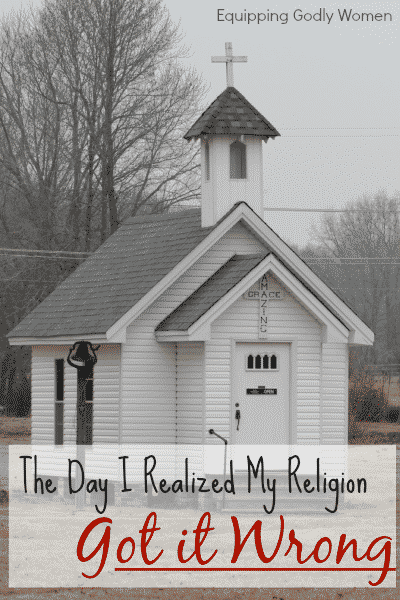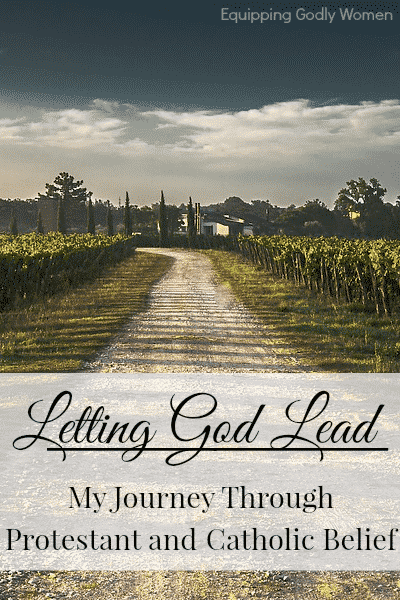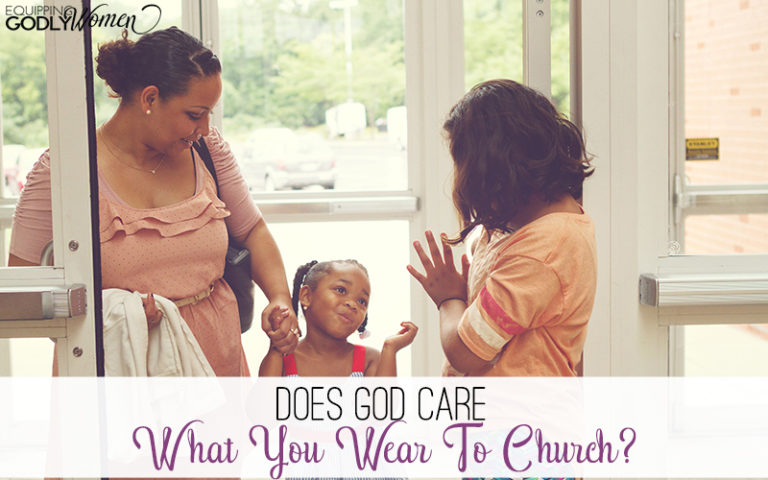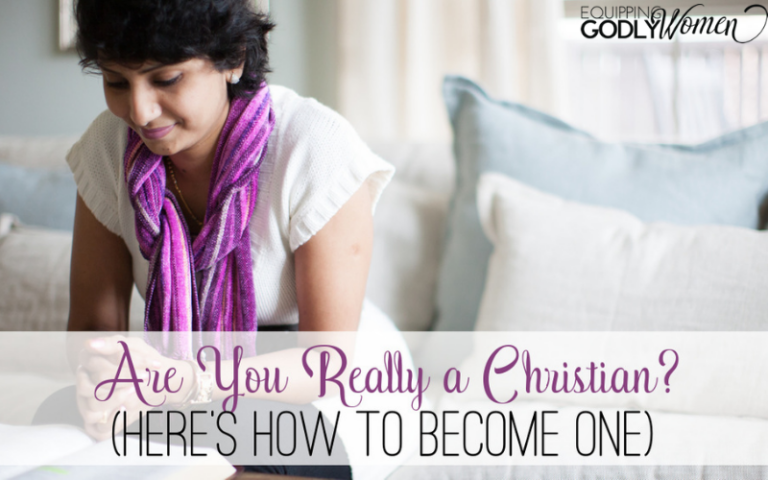The Day I Realized My Religion Got It Wrong

This post is the first in a series entitled: Letting God Lead: My Journey Through Protestant and Catholic Belief. Click here to find out more about this series and to find a list of all of the posts. *This post contains affiliate links.
It started out innocently enough. My mother-in-law (a devoted Catholic) gave me the book Surprised by Truth, which is a compilation of 11 very different peoples’ Catholic conversion stories. At first, I didn’t really understand why she was (albeit very politely) trying to “convert me.” Didn’t she realize we were the same religion? I mean, we were both Christian and we both believed what I thought were the “essentials” (The trinity, Jesus died for our sins, Heaven, etc). So why did it matter if I was Catholic? Did she think I wasn’t Christian?
(My mother-in-law is wonderful. I wasn’t upset. Just confused. I didn’t understand what all the “fuss” was about.)
You see, faith has always been a very important part of my life. My mother was a preacher’s daughter and a lot of that commitment to church and to the faith was passed right on down to me. Growing up, my mom and I were at church pretty much every time the doors were opened it seemed–at least three times a week. And we usually showed up early and stayed late as well.
And we weren’t just “Sunday Christians” either. My mom and I both read our Bibles, read other Christian Living books, listened to Christian radio, prayed, helped others, etc etc very regularly. We both sang in the church choir and praise band and even attended the same Bible college (though not at the same time). I was helping out at church multiple times a week, was helping out in the community, and had just started a Christian blog. Not that any of these things MAKE you a Christian–they don’t. But if she needed to worry about “converting” anyone, it wasn’t me.
But hey, I enjoy reading about Christianity and Christian beliefs and I wasn’t really that busy at the time, so I figured, “Hey, why not?”
Love Catholic conversion stories? Find it on Amazon!
As I sat down to read Surprised by Truth, honestly, I struggled to make it through the first chapter. I seriously wanted to chuck the book at the wall. I’m a very logical type thinker. I’m not going to believe something “because someone says so.” I want proof. I want facts. I want Scriptural support. Not that faith isn’t important–it is–but first the person better prove to me that they’re worth listening to. And here, the first chapter was full of “I believed because it just felt right, and I came into the Catholic church rejoicing and shouting “Hallelujah” to saint whoever!” Please. Spare me.
I mean, if you enjoy reading conversion stories (like this one you’re reading now 🙂 ), then it’s a really good book. It just wasn’t what I thought it would be or what I was looking for. But I kept reading. Because “hey, why not?”
And as I kept reading and wading through all the fluff, it wasn’t long before certain sentences began to jump out at me (both good and bad), and I started learning new pieces of information that no one had ever told me before, although in snippets.
Sentences like: “To be deep in history is to cease to be a Protestant.” Now I’ll be the first to admit, I knew VERY little about church history. If I knew more, would that change the way I saw things?
And then, three-quarters of the way through the book, I finally found an author with a similar background as mine (Baptist), who gave an account that wasn’t fluffy, but that was actually full of facts and support and that made a lot of sense. Suddenly, things I was once so sure of… I wasn’t so sure of anymore.
The real turning point happened, though, during a conversation with my husband. I’m not sure what we were talking about specifically, but suddenly it clicked that “Protestant” was derived from Martin Luther’s protest. Now, yes, I did know this before, but I had never really thought about it much. Except, this time, I did.
How–in the 16th century–could some guy suddenly decide he didn’t like the church so he was going to make a new one of his own? Now, I’m not arguing that the Catholic church was in the right. From what I’ve read since then, there was definitely some awful, sinful behavior going on that needed to be addressed. (No one’s perfect, not even the church.) BUT, what gave Martin Luther the right to pick the beliefs he wanted to pick and to abandon the rest? Who was he to get to say what was Scriptural or not?
It was at that moment I realized I couldn’t be Protestant anymore. I couldn’t support a man who left the church, took things into his own hands and decided for himself what truth should be. It just wasn’t Biblical. We’re called to repair, not divide.

Ceasing to be a Protestant wasn’t a problem for me. We did a lot of church-hopping when I was younger, and I can count NINE churches I’ve regularly attended in my life so far. I’ve never taken a denominational label–just called myself “Christian”–and I was still a Christian, so that was fine.
But investigating the Catholic Church’s beliefs was a much longer and more tumultuous journey. A journey which involved a lot of questioning, a lot of struggling and a lot of tears. A journey which I hope to cover throughout this series.
So whether you are Protestant or Catholic or something else all together, I hope and pray you will join me with an open heart and an inquisitive mind. I’m not seeking to convert you or to say that one side is right and the other is wrong. At the time of this writing, I’m neither Catholic or Protestant, and I’m still unsure as to how this journey will end.
But what I DO know is it’s been quite an enlightening year and I’ve learned a lot. And I’d like to share some of what I’ve learned with you. Because honestly, wouldn’t you like to know if what you believe is true? I hope so. And I hope you’ll continue to join me every Wednesday throughout this series to find out more.
As we start this series, I’d like to know: Are you a Protestant or Catholic? Did you grow up that way or did you switch?

Ready to read more? Don’t miss the rest of the posts in the series!
The Day I Realized My Religion Got it Wrong
10 Common Catholic Church Myths that Critics Believe
Is the Eucharist Really Just a Symbol?
Who has the Ultimate Authority? A Biblical Look at Sola Scriptura
A Brief Look at the History of Christianity
What All Christians Should Know About Priests, the Pope and Confession
What Do Catholics Really Believe About Mary, Saints and Statues?
Infant Baptism or Believer’s Baptism? Which is Correct?
What is Purgatory? What are Indulgences?
Why Do Catholics….? Honest Answers to Your Burning Questions








Hey! I’m neither Protestant or Catholic, because you don’t have to be. I’m just simply Christian and I go to a Christian church (Toronto Christ’s Congregation, I think), and we are simply Christian. We follow the Bible, nothing else, and I guess that makes us not Catholics, but we’re not really Protestant either. At Church, first we sing hymns (anyone can choose one), then the adults have a person who goes up and talks and the kids have Sunday School, where they learn about the Bible and things like that. Every week the person who goes up to talk is different, and in Sunday School they have many different teachers. We believe that the Bible is the Word of God and that we can go to there for help and guidance, but I don’t know whether or not we believe that the Bible is all there is. At Church we learn to pray and to talk to God and read the Bible and to do as He has commanded. The thing is we don’t have just one leader or anything. There are people who are generally respected and known to be good “leaders”, but really mostly it’s just all of us working under God. He is the ultimate authority. I guess we’re sort of a mix of everything. What do you think?
Interesting! I think the technical term is “nondenominational.” (Nondenominational encompasses a lot of things!) There are things I like about the concept, and things I don’t. For example, what happens when someone gets things wrong? If there is no ultimate authority on disagreements? Then it ends up being each person’s interpretation for themselves…
Sorry, but I don’t understand what you mean about “gets things wrong”. Has the wrong idea? Makes some bad mistake? Can you clarify that please? And for there being no ultimate authority on disagreements, well, we don’t really disagree that much anyways, and we often have times where everyone sits done together and talks and prays. I guess it’s sort of a group effort to work things out. It’s interesting. 🙂
I just mean if two leaders have a disagreement about something in Scripture. While everything would be fine and pleasant at first, what happens if, say after 50 years, one person taught that salvation required works while others taught faith alone, for example? I just mean, eventually, disagreements would inevitably happen and things would break down without one ultimate authority.
Hi, Paula. Just going through old comments and making sure I replied to everyone. Did you see this post? https://equippinggodlywomen.com/faith/who-has-the-ultimate-authority-a-biblical-look-at-sola-scriptura/
In all honesty, to be a Protestant is to be closer/the closest to what God wants of us as Christians, because it’s sole basis is on the Word of God, the Bible.
Martin Luther didn’t suddenly decide one day, “Hey, I don’t really care for this one Catholic thing, so I think I’m gonna just pick and choose what I do like and start a new church!” Uhh, no. He was divinely inspired by God! He was convicted to see the truth and the Holy Spirit led him to where he ended-up going and thus he became a wonderful Christian leader. Luther didn’t merely “pick and choose”, he realized, through divine intervention/inspiration and prayer, that what the Catholic Church was teaching and preaching, what it was doing, what it was believing, were not of the Bible (indulgences, idol worship, salvation through works, praying for the dead, etc).
Luther’s eyes were opened to the atrocity of the Catholic Church and God led him down a path to righteousness. The Lutheran religion (which is the original Protestant religion) is a result of choosing to focus MORE on the Bible and it’s Holy teachings. It’s a result of choosing the infallible Word of God over the flawed word of man. Unfortunately, the Catholic Church was built upon and continues to grow on man’s word and not God’s (they still sell indulgences, they still teach salvation comes through works and not Jesus’ sacrifice alone, and possibly worse of all, they bend and change their beliefs and practices based on what’s popular in the world, even if it goes against Biblical teachings, i.e.: homosexuality, female priests, following other religions, etc.).
I urge you to prayerfully take a deep hard look at what the Catholic Church teaches and condones vs what the Bible leads us to do and believe. You will probably notice soon enough that the Catholic religion isn’t a Christian one at all! I pray that you will someday see the truth and perhaps make a new blog entry then. 🙂
I don’t disagree at all that the Catholic Church really needed some stern correction–they definitely did! Yet, I’m not convinced that it was their doctrines that had gotten far out of whack as much as the way they were living/carrying out their doctrines.
I hope you will continue to read through the rest of the posts in this series, as I have done a TON of research on many of the areas you have mentioned. For example, the Catholic church does NOT teach salvation through works. I explain the official Catholic view and givea very Biblical case against faith alone here: Is Faith Alone Enough?
Also, they don’t simply make up their teachings based on what some random person decided–they do their best to hold to ALL of the apostles’ teachings, both those that were written down (Bible) and those that were passed down orally. I have a very in-depth (and Bible based!) explanation of this here: Who Has the Ultimate Authority? A Biblical Look at Sola Scriptura
And thirdly, from everything I’ve read, the Catholic church does not change their beliefs willy nilly based on what is popular. All of the main Catholic teachings today are the same ones that were taught by the early church fathers. Especially the examples you gave: the church still does and always has been opposed to homosexuality and female priests. Not sure what you mean by following other religions. I go into the history of the church here: A Brief Look at the History of Christianity
Please know that I am 100% a Bible believing Christian. I love the Bible and value it very highly. I have no agenda here other than to find the truth to prayer and study. I really, really hope you will continue to read along through the rest of the series! There is a TON of really good information. Read it not to convert, but simply to be informed and to clear up any misconceptions you may have.
Okey-dokey, here’s a quick response to what you commented with ….
1.) The Catholic Church really needed some stern correction – both then AND still even now today. They still need correction in today’s world for the reasons I stated earlier (and will now validate since you don’t want to believe me about them).
2.) I do not doubt that you have spent your fair share of time doing Bible studies and the such, but are you formally trained in Theology? Do you have a degree in Religions of the World? Anything of the such? My father, an ordained minister does, and I learn both through his guidance and as I study the Word of God. I have access to 24/7 theology answers. It’s great! And I’m not just spewing random things I find online, I’ve done my fair share of studying, too. So, please trust me when I say that Catholics do indeed still teach and practice salvation through works/good deeds. Here’s a resource to back that up, which is actually written by a Catholic: https://www.aboutcatholics.com/beliefs/a-clarification-of-good-works/
3.) I never said that Catholics “simply make up their teachings based on what some random person decided”. I was countering YOUR CLAIM that that was what Luther did. I was correcting you by stating that Luther DID NOT do that, like you originally claimed. Please don’t read into what I write or try to put words into my mouth.
4.) And last – but certainly certainly NOT least – the Catholic Church DOES INDEED change their teachings and practices based on what is popular! Oh boy, do they! They always have – and probably always will … this is what happens when a religion is built on a man (the Pope) and not solely the Word of God! Below are several examples of how and the resources to back them up (I can find many more, if needed) …
a.) Homosexuality Is Okay and We Should Not Judge That Sin: https://www.telegraph.co.uk/news/worldnews/the-pope/10208802/Pope-Francis-reaches-out-to-gays.html
b.) Female Priests Are Ordained and Practice in the Catholic Faith: https://www.arcwp.org
Erika
I do have some formal training in Theology, as I went to a Christian Bible college and received some formal education there. Admittedly not enough, but then again, who can say they really have ever learned “enough?” But really, there are very smart, educated Catholics and very smart, educated Protestants, so it isn’t a matter of simply learning enough.
As to the article on Catholics preaching salvation through good deeds–I read the article and that’s not what it says. Again, PLEASE read my article Is Faith Alone Enough?
I am not trying to say either side makes things up willy nilly. Sorry if it came across that way. I do not believe Martin Luther was inspired, however.
a. Homosexuality article: The pope was not saying homosexuality is okay. He said he wasn’t going to be judgmental of someone who is inclined to sin differently than him. I think most Christians can agree that there is a difference between having a sinful nature bent toward homosexuality, or lying, or alcoholism or what have you and actually acting on those behaviors. That’s why he said “You already know the Catholic Church’s stance.” — he wasn’t changing anything. Just saying that while the behavior is wrong, it is also wrong to treat people the way most gays have been treated.
b. Hmm… That is news to me. Everything I researched said women can’t be priests. I’d be inclined to think that that is still NOT the official teaching of the church, but a subset with a different belief.
c. I have to admit, I know very, VERY little about the Muslim faith (too much time researching Christianity, I guess!) so I can’t comment intelligently here.
Also, I want to applaud you for dedicating so much time and effort to reaching out to women and trying to equip them in godly ways! My problem is that I’m just concerned about some misinformation that you are providing to people. I fear that a person who is seeking information about Christianity and/or who are new to Christianity will be influenced in the wrong way. I am not trying to take away from your desire to do the right thing, however. 🙂
🙂 I appreciate that. I don’t expect everyone to agree 100%. I’m just doing my best to research as much as possible and to be unbiased as possible and to present as much information as possible so that people can make an informed and intelligent decision for themselves, instead of just automatically accepting whatever information they were handed down.
As I stated above:
If you truly believe that God’s Word is not enough, then I cannot continue to discuss any of this with you as it will be a futile waste of time. 🙁
I am sorry and will pray about all of this.
Erika,
It is obvious that your faith is very strong and I think it is wonderful that you have your father as a spiritual advisor. But it is hard for me to understand how/why you are so determined to judge Brittany and indicAte that good, well- meaning debate of ideas/faith/doctrine is a “futile waste of time.” To me, regardless of my faith/denomination, it just doesn’t seem to jive with Jesus and His teachings. I believe your faith is Bible-based. So, If there are any instances of Him walking away from a Jew or sinner of any sort because they were a “futile waste of time,” please share those instances. I believe that we are all called to be Holy and Christ-like. That means being accepting (ie. “Hate the sin, LoVE the sinner”– homosexuals). And, I certainly try every day to NOT judge others, that is certainly NOT my place. But, I can always try to love others and constantly strive to live the Gospel. Maybe you feel that you already completely live Christ’s words. I know that I don’t yet, even though I try each and every day!!
May God bless you.
I’m going to simply answer your questions: I am a Spirit-filled believer and follower of Jesus Christ. Jesus Christ is my mediator and he’s the one and only mediator between God and man—His words. I look to scripture, not any particular leader, church dogma or tradition. And yes, I know that I know that I know that what I believe is true. 🙂
May we all follow Christ alone.
Hi, Cam! One thing that is important to mention–all Christians follow God and Scripture, but the Catholics do have a very good case for why they follow tradition as well. I hope you’ll take the time to read my follow up post that explains why more thoroughly–Who Has the Ultimate Authority–A Brief Look at Sola Scriptura. It’s at least a read to know why! 🙂
Hi Cam, Everything I know about God is what he’s walloped me over the head with. Ten years ago I had a full-blown Road to Damascus experience. Thirty years before that, I had a huge experience of eternity, infinity, timelessness, perfect love, bliss, safety. We are always in eternity. I was brought up Catholic and hated every minute of it. I have tried going back to the church, but I am heterosexual and not a communist. I love St. Teresa of Avila, John of the Cross, Francis of Assisi, etc. I don’t know if I’ve ever met a priest, monk or nun who has the first idea about these saints or about God.
How can you be sure what you think about God is correct and what every priest, monk or nun you’ve ever met is wrong…?
Hi Brittany, If you read an old book called “Mysticism” by Evelyn Underhill (free online), that would cast some light on this subject for you. There’s a shorter version of that book, which I haven’t read. It’s call “Practical Mysticism.” (I think.) I am pretty sure it was the 20th monk Thomas Merton who said (something like), ‘Anybody who thinks he can tell you in words what contemplation is, doesn’t know what contemplation is.” You said, “How can you be sure what you think about God is correct…? Oh, dear….words can’t express these things. If I have understood him correctly, St John of the Cross says that when we experience the absolute truth of God, that doesn’t mean we are experiencing the whole truth. If I am right about this, he also says that as soon as we start talking about these high experiences, we are no longer in the truth. I believe he means that the experience, the event, is one thing, but the moment we start talking about that we are back in our everyday mind. We can’t express these things in words. We can’t even really properly remember or recapture these things in our minds, until something happens again. St. John talks about The Dark Night, and the darkness is all about our lack of certainty, an absence of being “sure.” It is not about thinking. It isn’t that reason plays no part. But I think it’s Richard of St. Victor who talks about going “above reason” and “beyond reason.” This path–what people call contemplation or mysticiam is, I AM SURE, the best possible road a person can take through life. It’s a very bumpy road. I wouldn’t give up this journey for a thousand worlds. There’s nothing like it. Nothing on earth comes near to the rewards you receive even in this life. If I can do this, so can anybody. But most people don’t know it’s there to be done. no one tells them. You don’t have to to be anybody special to “succeed” in this work. That’s the Good News. At the back of the big Underhill book, there’s a list of lots of spiritual superstars. You can get lots of their books free online. Another interesting person is Lilian Stavely, a posh English woman who got stuff all the time, just like St Teresa did. She published her books around 1920. Stavely’s books are free to download online. So are most of St. Teresa’s, etc. Sorry for typos, I can’t scroll up to check for mistakes.
That doesn’t answer my question, though… If your thoughts are based on your experiences… how do you know your experiences are correct? Lots of people have experiences every day, and most of them are different. Saul/Paul in the Bible had an experience. Jonah had an experience. Atheists have experiences… If we all have experiences and come to different conclusions–then doesn’t that lead one to believe that simply having an experience is not a reliable indicator of truth?
“My job is to inform, not to convince.” Saint Bernadette.
See also Soren Kierkegaard and Dietrich Bonhoeffer.
And the Desert Fathers.
I am a Pentecostal raised young women; I put my faith on the back burner in my late teens and when I started coming back to God I want to a non-denominational Church. I am was drawn to this post and I pray God speaks to us all!
I’m glad you enjoyed the post! Make sure you check out the rest of the posts in the series as well–there’s a LOT of really good stuff in them that will really make you think and improve your relationship with God and you dig in and go deeper! 🙂 Link: My Journey Series
I, too, am on a journey – to find God. I always knew Jesus since I was a toddler – really knew Him. I was raised Missouri Synod Lutheran (baptized and confirmed). I grew up with either Lutheran or Roman Catholic family members – so I was very comfortable in either place. I became a Benedictine Oblate 37 years ago (we are an ecumenical group!) at a local women’s monastery. I was firm in my faith and theology but I was looking for something deeper – who was Jesus “really” and how did the church worship “really” and what did the early church “really” believe and how has it changed – and should it have changed? Everything shattered when our only son died at 28; the victim of suicide. I could not find him nor could I find God. For the past five years since his death I have been searching and I am finding answers in the ancient church – Eastern Orthodox Christianity. Answers to questions I have always asked… and I am finding comfort finally. I have a long way to go and converting to orthodoxy is scary in a way, but I keep hearing come and see and you will find ME. It will be a big step if I do convert, but the alternative feels so empty. Blessings on your website and your journey as well.
Yes, converting is very scary! One thing I noticed, though, is that you wrote “the alternative feels so empty.” I would encourage you that–whatever you decide–you base it on fact, not just on feeling. Seek truth, not just what “feels right.”
I was reared Catholic. I got saved and left the Catholic Church. It concerns me to read stories like yours when I experienced what is taught in the church. The bible has to be the ultimate authority and there is a lot of Catholic doctrine that is not backed by scripture. I’m not saying you can’t be a true Christian and be Catholic. I’m saying there is a lot of extra teachings that aren’t supported in the Bible.
(Just for the record, I ended up not converting). But I think the important thing to understand is the distinction between official Catholic church doctrine and what each individual church teaches. While they *should* be the same, they aren’t always–which is true of any denomination. For this series, I did my best to look JUST at official teaching (which may have been a little easier for me, since I didn’t grow up in the Catholic church, so I didn’t have a lot of the preconceptions).
Also, even as a non-Catholic, I have to admit, there are really good reasons why not everything Catholics believe is in the Bible. Not to say all of it is true/untrue, but I really encourage you to check out the series post I wrote about why that it is here: Who Has the Ultimate Authority? (A Biblical Look at Sola Scriptura). I really had to adjust my thinking after I learned the things I shared in this post, and I would love to hear your thoughts on it as well!
Bible didn’t even exist until the Catholic Church decided which scriptures go and which ones stay. So the Bible everyone reads now was actually “put together” by the Catholic Church.
I’ve read in one of the comments on this post how the dead are sleeping and know nothing until the Judgement day. And sure, there are verses which support this (like Ecclesiastes 9:5,6). However, what about Luke 23:42 And he was saying, “Jesus, remember me when You come in Your kingdom!” 43 And He said to him, “Truly I say to you, today you shall be with Me in Paradise.”
It’s contradictory! Surely Jesus wasn’t lying. So how do we decide what to believe? If the Bible is the ultimate authority we can argue about matter like this forever because two opposite things are supported in the Bible.
And there are so many examples like this one.
From my understanding, Martin Luther never intended to “start a church”, just to fix some of the terrible things happening like the selling of “indulgences”. And I think most of us can agree that those are not Scriptural.
What am I? I’m a Christian. That is all.
I’m just Christian too 🙂
Yes, I completely agree that that was not his intention (though that is pretty much exactly what he did!) I researched into Martin Luther and that whole controversy for a post later in the series. You can find all the details on that here: A Brief Look at the History of Christianity.
I also looked into the doctrines behind indulgences–which I’m still not sure about, but what I found was really interesting! That series post is here: What is Purgatory? What are Indulgences if you’re interested. It’s a good read!
Could you share how your family feels about your spiritual journey?
Have you shared what you’ve learned about some Protestant beliefs you had never questioned before with your mom and what does she say to all of it?
Absolutely. Before I started this series, my husband made it clear that he would not pressure me into becoming Catholic. Of course, he would like me to be, but even with him Catholic and me not-Catholic 95% of what we believe was the same anyways, and all of the things we disagreed with weren’t things that would affect our day-to-day lives in any way. It wasn’t that I thought Catholics were wrong/sinful/immoral–just that I didn’t agree with all of their conclusions and wasn’t sure that all of their practices were really “necessary.”
I think after reading through all the things I wrote throughout this series, he really got his hopes up, especially after how pro-Catholic the beginning posts were (like the Eucharist one and the Authority of the Church one for example). So when I told him *spoiler alert* I decided not to become Catholic, he was saddened, but we talked about why, and he understands. Many of the things I question are things he also doesn’t really have a good answer to–he just takes them on faith in the church while I do not.
We still go to Catholic church together, send our kids to private Catholic school, pray together, and agree on the way we want to raise our children. Our son’s bedtime prayers just look a little different depending on which one of us is saying them with him, lol, so he gets both. It really isn’t a source of conflict at all, currently. My husband is always so appreciative when I teach our sons spiritual things, to which I reply…. well… I’m Christian too… lol. The label is really the biggest difference, not the beliefs or practices.
I’ve talked to my mom about it and I’m sure she’s read through this series, but she hasn’t said much either way. I doubt she agrees with all of the conclusions I’ve come too, but she hasn’t seemed to have any problems with me changing my mind on a few things. If the situation were reversed, and she had changed her mind on equivalent matters, I wouldn’t be too concerned, as long as she still believed the essentials. I’m guessing she would feel the same. There is no tension or conflict or anything.
Hi! can I ask you how you dealt with the sacrament of marriage? Did you marry in the Catholic church?
We married outside of the Catholic church because neither of us knew it had to be in a church to “count.” We later had our marriage confirmed, or whatever it’s called. They didn’t care that I’m not Catholic as long as I agreed to raise our kids Catholic, which is fine with me.
Can he still recieve the communion?
Yep. He couldn’t for a while when we found out that our marriage didn’t “count.” But now that we made everything official in the church, he’s back in the clear.
Hi Brittany, I grew up in various churchs as my family moved a lot. I’m now a devoted Anglican. I’ve been dating my boyfriend (and best friend) for almost six months. He’s a devoted catholic, currently studying theology. The closer we’ve become, the more naive I’ve realised I am about Christianity and how often I’ll say things like “I remember when my youth leader explained it as such”. My faith was not my own. He said at one point that he was worried I was only being so accepting of Catholism because of him. That’s not true. He’s deep faith has made me realise that I don’t know nearly enough about the faith I have, and sparked an interest to study the Bible deeper. The more I research, the more I realise that the Catholic faith is grounded in the very beginning of Christianity, unlike the reformation as you said in the post above. I discovered your blog from your post on transubstantiation, something I have struggled understanding. I want to thank you for your staight forward and logical thinking, being of a scientific mind myself. I will probably finish reading all your post this evening as I can see there is a wealth of information within. God Bless xx
I know the feeling of your faith not being your own! Been there! Hope you have a chance to look through this series and that you really learn a lot! (p.s. I just started a new series too, if you are interested. It’s going to be just as good!)
I’m Roman Catholic. I grew up Baptist (Product of a bus ministry), saved at the ripe age of 9 at VBS, attended the Church of God with my grandmother and the Methodist church with my grandfather. Broke away at age 21 to explore a myriad of denominations, but mainly non-denominational. Explored being agnostic in the desert years. Later, after coming out of the desert, joined the Methodist church with my teen son (he wanted to go because of a girl… He broke up with the girl…). But now, I am happy to say, I have come home to the Catholic Church.
I just found your blog, Brittany, and I am intrigued by your story thus far. Let’s continue this journey…
Wow! Sounds like you’ve had quite the journey of your own!